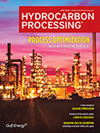Acid Gas Removal
Why sulfur plants fail: An in-depth study of sulfur recovery unit failures—Part 2
Equipment malfunction or an unplanned shutdown of a sulfur recovery unit (SRU) can have a significant effect on a production company’s profitability, along with an equally serious impact on personnel safety and the environment.
Soft startup of best practices for the commissioning of amine plants
The startup and commissioning of hydrocarbon plants can present unique challenges that, if not anticipated and addressed in the pre-commissioning and commissioning periods, will inhibit plant startup and increase the difficulty of achieving product specifications in a timely manner.
Investigation and diagnosis of startup foaming issues at a new tail gas treater
In May 2021, Phillips 66 started up a new methyl diethanolamine (MDEA)-based tail gas unit at its Belle Chasse, Louisiana, refinery.
Reliability: Exploring better compressor sour seal oil traps
An interesting case involving sour seal oil traps in an offshore application recently came to our attention.
Specifying internals in sour water strippers—Part 1
A sour water stripper (SWS) system is a common process in petroleum refineries and other processes where hydrogen sulfide is present.
Optimization study for vacuum offgas amine sweetening unit using simulation model
Technology is constantly developing, and the competition is intense.
Optimize flare gas recovery system design to reduce emissions
Emissions from flares worsen air quality and produce waste gas. A flare gas recovery system is designed to facilitate CO<sub>2</sub> reduction.
Improve the safety and efficiency of natural gas sweetening units
After natural gas is extracted from onshore and offshore sites, it must be transported and processed.
Intensification of sulfur processing units by oxygen enrichment and process flowsheet optimization
The consistent global trend toward improvements in air quality and tighter regulations on emissions, as well as the International Maritime Organization’s shipping regulations, continue to mitigate sulfur levels—not only in conventional transport fuels (petrol and diesel), but also in jet fuels, fuel oils and other heavier distillates.
Use submerged combustion systems to efficiently destroy hazardous plant waste
In the production of clean fuels, plastics and other hydrocarbon-based products, refineries and petrochemical facilities generate unwanted (waste) byproducts. Having no market value, the undesired byproducts must be recycled, minimized or eliminated. Depending on the feedstocks, end products and reactant materials, the unwanted materials can be gases, liquids or multiphase materials.

- Petrobras wrapping up due diligence to buy back refinery from Mubadala 7/26
- US court rejects EPA denials of 2022 small refinery biofuel waivers 7/26
- Mexico seeks more 2025 fuel import deals after refinery delays 7/26
- PETRONAS, Eni and Euglena reach FID to construct a biorefinery in Malaysia 7/26
- ExxonMobil signs carbon capture agreement with CF Industries in Mississippi (U.S,) 7/26
- WoodMac: LNG truck sales impacting Chinese road diesel demand 7/26
- Digital Exclusive: SPECIAL FOCUS: Digital Technologies—Utilize process simulation digital twin to optimize condensate yield
- Digital Exclusive-Flare system design: Liquid pockets in flare headers
- Hydrogen-rich content gasoline: A new concept for paraffinic gasoline reformulation
- Alarm rationalization at Kuwait National Petroleum Company (KNPC) refineries




